Quantum mechanics is the most successful theory in human history, yet it also harbors profound paradoxes and confusions that challenge our fundamental understanding of the natural world.
Measurement Collapse
Measurement collapse refers to a very strange phenomenon in quantum mechanics: when we measure a quantum system, it suddenly shifts from an indeterminate state to a definite state. This process is known as wave function collapse.
To understand this phenomenon, we first need to grasp what a wave function is. A wave function is a mathematical function used in quantum mechanics to describe the state of a quantum system. It contains all possible information. For instance, the wave function of an electron can inform us about the probability distribution of its position, velocity, spin, and other properties.
However, the wave function is not a directly observable physical quantity; it is merely an abstract mathematical tool. We can only obtain certain information about the wave function through measurements, such as the position or spin of the electron.
Yet, measurement is not a simple process; it affects the quantum system and can even alter its state. When we measure a quantum system, we are actually interacting with it, linking it to our measuring device or the environment. In this way, the wave function changes from a superposition of many possibilities to a definite state with a unique outcome.

Measurement collapse refers to a very strange phenomenon in quantum mechanics. (Illustrative image).
Even more surprisingly, this process is irreversible; once the state of the electron is measured, it cannot revert to its original superposition state. This raises many philosophical and physical questions. Why does measurement alter the state of a quantum system?
This question has no clear answer in quantum mechanics; it can only rely on the Copenhagen interpretation. It is believed that the state of a quantum system is described by the wave function, which represents the probability distribution of the system rather than the actual physical state. When we perform a measurement on a system, the wave function collapses, and the system randomly selects one of the possible outcomes, which is the reality we observe.
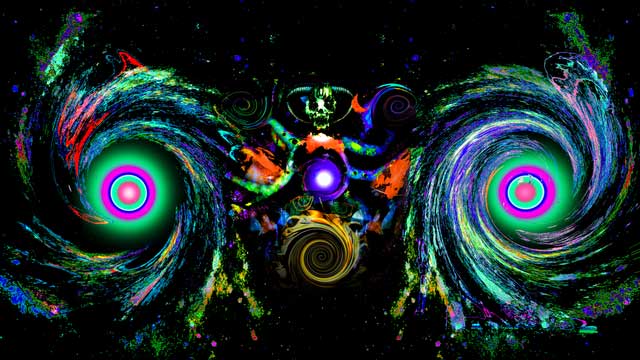
It is believed that the state of a quantum system is described by the wave function. (Illustrative image).
The measurement process is not analyzable and is not bound by physical laws; it is a fundamental physical phenomenon, akin to gravity. Although the Copenhagen interpretation can adequately explain the experimental results of quantum mechanics, it also raises many questions and controversies. Why are measurement results random, and why are they irreversible? There are no definitive answers to these questions. If we could resolve the conflict surrounding measurement collapse, we would be able to better understand and control quantum systems, which would have a profound impact on human civilization. For example, we could realize quantum computing, quantum communication, quantum encryption, etc. These technologies all rely on quantum superposition states, potentially significantly improving computational power, communication capabilities, security, and more.
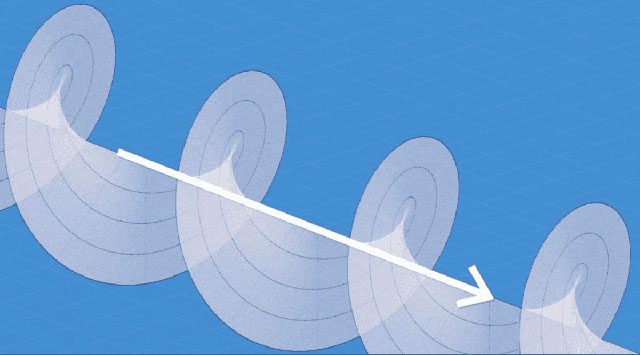
The measurement process is not bound by physical laws. (Illustrative image).
The Observer Effect
To understand the observer effect, we first need to grasp another core concept of quantum mechanics: The Uncertainty Principle.
The Uncertainty Principle states that certain physical quantities of a quantum system cannot be measured accurately at the same time, such as the position and momentum of an electron, the energy and time of a photon, etc. There is a minimum uncertainty between these physical quantities, defined by Planck’s constant.
This uncertainty is not due to measurement accuracy or device errors; it is determined by the nature of the quantum system. It is a physical limit that cannot be surpassed. The existence of the Uncertainty Principle indicates that the state of a quantum system is incomplete and is merely the result of partial measurements, which is the reality we observe. This means that our observations will affect the state of the quantum system and even alter its outcomes.
For instance, when we use different devices or methods to measure the position of an electron, we will obtain different results, and these results are all correct because the position of the electron is uncertain and only manifests when measured to a specific value. Similarly, when we measure the polarization of a photon using different instruments or methods, we also obtain similar results. These examples demonstrate that the states and outcomes of quantum systems are determined by our observations rather than by the systems themselves.
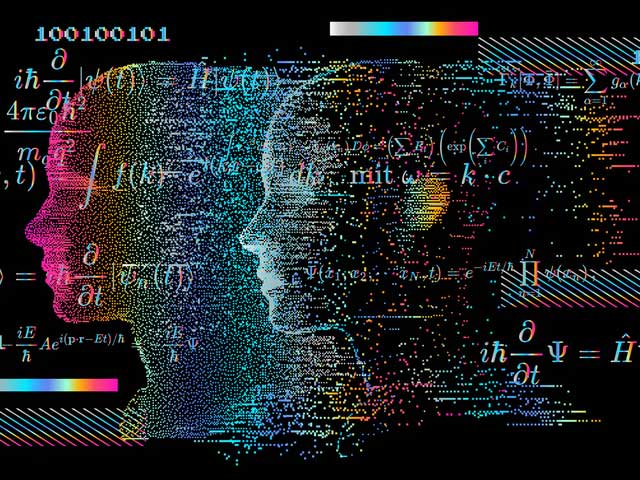
It is believed that the wave function is merely a mathematical representation of our knowledge about the quantum system. (Illustrative image).
So how does the observer effect occur? Quantum mechanics does not provide an answer to this question. It can only rely on subjective assumptions about the wave function. It is believed that the wave function is merely a mathematical representation of our knowledge about the quantum system, not the actual physical state of the quantum system. When we observe a system, our knowledge changes, leading to changes in the wave function, known as the observer effect.
The emergence of the observer effect is not caused by physical processes but by our psychological processes; it is a subjective physical phenomenon, much like sensation. While the subjectivity of the wave function can clearly explain the observer effect, it also raises many questions and controversies.
Why does our knowledge affect the states and outcomes of quantum systems? Why do our mental processes influence physical phenomena? There are no definitive answers to these questions either. If we could resolve the conflict surrounding the observer effect, we would be able to better understand and control physical systems, which would have a significant impact on human civilization. For instance, we could achieve quantum invisibility, which uses the observer effect; it could make an object disappear from the view of some observers while existing in the sight of others. This technology could be used in military, security, and other aspects.
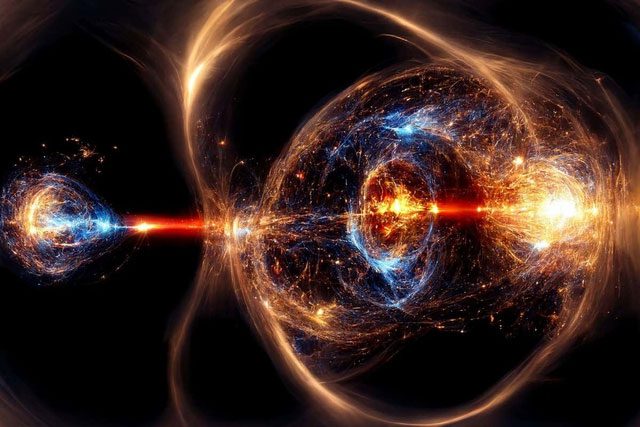
General relativity is a theory describing gravity proposed by Einstein in 1915. (Illustrative image).
Quantum Gravity
Quantum gravity refers to the combination of quantum mechanics and general relativity, attempting to describe the behavior of gravitational forces at the microscopic scale. Quantum gravity is one of the most challenging issues in physics due to its severe contradictions with general relativity. To understand this conflict, we first need to comprehend what general relativity is.
General relativity is a theory describing gravity proposed by Einstein in 1915. It asserts that gravity is not a force but a curvature of spacetime. Spacetime refers to the four-dimensional unity of space and time, which can be distorted by matter and energy. Matter and energy inform spacetime of its curvature, and spacetime informs matter and energy how to move. This is the core idea of general relativity.
General relativity successfully explains many phenomena on a macroscopic scale, such as the orbits of planets, the existence of black holes, and the generation of gravitational waves. However, problems arise when we apply general relativity to the microscopic scale.
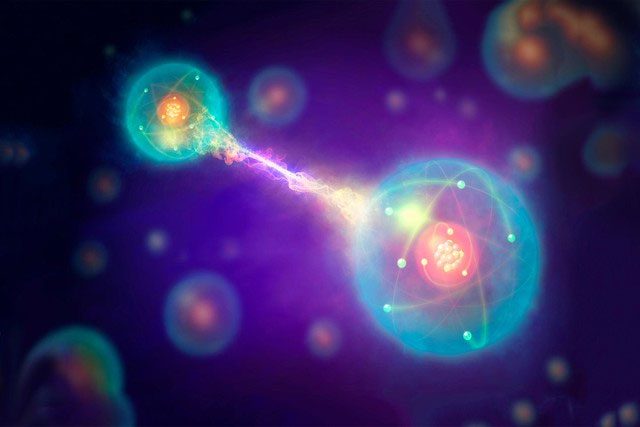
The microscopic world consists of discrete, uncertain quanta. (Illustrative image).
This is due to the general theory of relativity, which is a classical theory asserting that spacetime is continuous rather than discrete. However, quantum mechanics informs us that the microscopic world consists of discontinuous quanta, characterized by uncertainty and randomness. This leads to an incompatibility between quantum mechanics and the general theory of relativity.
When we attempt to combine both, we encounter infinite or nonsensical results. This presents the challenging problem of quantum gravity. The issue of this conflict limits our understanding of the material world, and at the same time, we cannot explain or predict some of the most fundamental questions related to the nature and origin of the universe, as well as the origins and destiny of life, etc. These issues represent the greatest mysteries of human civilization. If we can resolve the conflicts of quantum gravity, we will have a perfect theory capable of describing and explaining all physical phenomena, which would have a tremendous impact on human civilization.
The three main paradoxes of quantum mechanics are among the most profound and perplexing questions we have about nature, reflecting our understanding and exploration of the micro and macro worlds. These issues hold not only significant scientific importance but also profound philosophical and societal implications. If these problems can be solved, human civilization will usher in a new revolution and progress.


















































